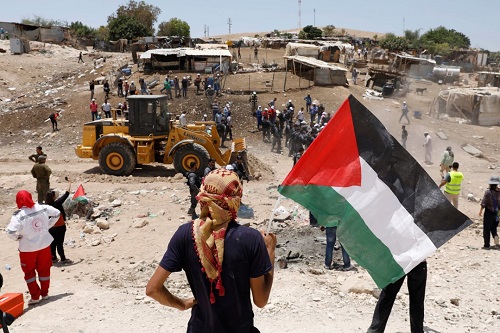EPA photo
By
OHCHR
Israel must stop its planned demolition of the Palestinian Bedouin village of Khan al-Ahmar, near Jerusalem, and must be held to account if it proceeds as scheduled with its destruction, says a UN human rights expert.
“The very real threat to demolish Khan al-Ahmar further exacerbates the coercive environment in which the village community lives, and could force residents to leave their homes,” said Michael Lynk, the UN Special Rapporteur for the situation of human rights in the Palestinian territory occupied since 1967.
“Forcing the transfer of a protected community would be a grave breach of the Fourth Geneva Convention, and could amount to a war crime under the 1998 Rome Statute,” he warned.
Khan al-Ahmar is a village of 180 Bedouin Palestinians about 15 km northeast of Jerusalem, within Area C of the West Bank, as defined by the Oslo Accords. The village has repeatedly been denied building permits by Israel, and demolition equipment was moved to its outskirts earlier in July, after the Israeli Supreme Court denied petitions from the villagers.
The people living in Khan al-Ahmar are descendants of Bedouin communities expelled from the Negev by Israel in the 1950s. The communities resettled in the West Bank, on the outskirts of Jerusalem, but they have since been under threat of forcible removal by Israel.
“I applaud the determined efforts of the Khan al-Ahmar residents to bring local and international attention to their plight. These people have practised largely peaceful civil resistance in a situation that is clearly unjust, and they have won support from many quarters for their determination,” said the UN expert.
Khan al-Ahmar is in an area between two large Israeli settlements, Ma’ale Adumim and Kfar Adumim, and an Israeli industrial zone called Mishor Adumim. Israeli and Palestinian human rights organisations say the village lands are important to Israeli plans to build an urban bridge linking these settlements to Jerusalem.
“I commend the efforts by those in the international diplomatic and political community, and human rights campaigners, to oppose the destruction of Khan al-Ahmar,” said the Special Rapporteur.
“International pressure has often been the only source of restraint on Israel’s unlawful actions to expand its settlements, annex more Palestinian lands and strangle any future agreement based on justice, equality and human rights, and one that brings a complete end to the occupation,” he added.
However, the Special Rapporteur warned that international condemnation alone would be unlikely to end the current ominous trend in the occupied territory.
“Many more Palestinian communities in Area C are at risk in the near future of forcible transfer. Within the E1 area alone, there are 17 other Bedouin communities which face the same coercive environment, and the same fate as Khan al-Ahmar,” Mr. Lynk said.
“To be effective, the international community must be prepared to hold Israeli decision-makers legally and diplomatically accountable for their unlawful actions. They must demand that Israel halts all measures that could result in forcible transfer, enlist diplomatic and political support to end the systemic human rights abuses to which Palestinians in the occupied territory are subjected, and ensure the occupation is ended.”
OHCHR
The Office of the United Nations High Commissioner for Human Rights (OHCHR) represents the world’s commitment to universal ideals of human dignity. We have a unique mandate from the international community to promote and protect all human rights.



No Comments Yet!
You can be first to comment this post!